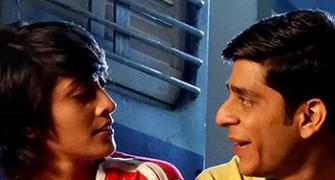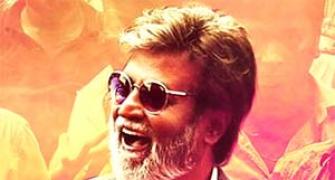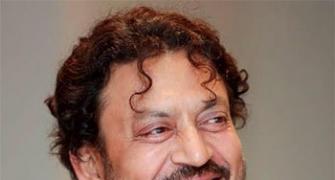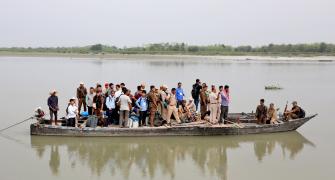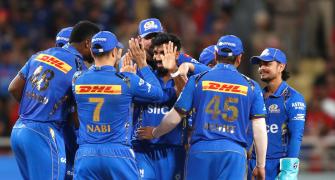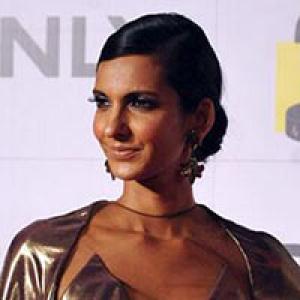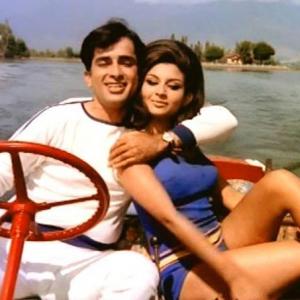
'We cannot be the country that created the Kamasutra and then we show flowers kiss and a child is born.'
'Censorship makes no sense today. People are already watching all sorts of things online.'
'The Censor Board needs to acknowledge the reality.'
Leena Yadav has worked with big stars in her first two films -- Aishwarya Rai Bachchan and Sanjay Dutt in Shabd and Amitabh Bachchan and Ben Kingsley in Teen Patti.
For her latest film Parched, which opened the 2015 Toronto International Film Festival, Yadav worked with actors who are associated with India's indie cinema -- Tannishtha Chatterjee, Radhika Apte and Adil Hussain.
Parched is a vibrant film about the tough lives of four women in rural Gujarat (the film was shot in Rajasthan) and their daily struggles, especially with the men in their lives. It has had a successful run at several international film festivals.
It recently opened in the US in a limited release playing to art-house crowds in New York, Los Angeles, San Francisco, San Jose and Freemont, and it will be available on DVD on August 7.
'Despite the appalling circumstances and events it depicts,' The New York Times writing about the film said, 'the movie's plain and unstinting affection for its lead characters gives Parched a frequently buoyant tone. Ms Yadav's frames are always filled with bright color, and the editing maintains an almost infectious rhythm as the characters move toward whatever self-determination they can find.'
Parched was shot by Oscar-winning cinematographer, Russell Carpenter (Titanic), and produced by Ajay Devgn and Aseem Bajaj, Yadav's cinematographer husband.
Aseem Chhabra spoke to Yadav, discussing the film's universal theme, its success in the international market and her hope of how it will play with the Indian censor board as well with audiences in India.

Your film has done very well in the film festival circuits, but it is so rare for Indian films -- outside of Bollywood films -- to get a theatrical release in the US.
Court had a very small release and before that, Siddharth.
The last Indian film to get a relatively big release was The Lunchbox. So congratulations!
Thank you so much. For such a big country, this is a really miniscule release.
But miniscule is fine. This is an independent, art-house film and even after this five cities release, it should have a life of its own. How many festivals have played at?
The last count it was 18.
And how many awards have you won?
The first major award was the Stockholm Impact Award. After that, we got the Best of the Fest in Palm Sprigs, which is considered a big deal. Then we won grand jury award for all the actresses in France, followed by the Best Actress award and the audience award at IFFLA.

So when you were working on the film in 2014 and early 2015, did you have a sense of how it will be received, especially outside India?
When I wrote the script and sent it to filmmaker friends across the world, that was very telling about the film. Rather than sending reactions to the script, they all wrote back-stories to me saying, 'I know this character in New York' and 'I know this person in Turkey.'
That's when I realised this was a universal theme waiting to be made into a film.
We hoped we would get that reaction from the audiences and that is exactly what we got. I have been to many countries and after every Q&A, women walk up to me to tell me their stories.
For me, this was essential. Because for a film like this, it is so easy to watch it and get attracted to exotic India, and then for anyone in the West to tell me that this is so timely because of the rapes that are happening in India.
It seeps in only after, that this is a story happening in my backyard as well.
Is this something you were concerned about? It's a beautiful looking film and Rajasthan and Gujarat always look good on screen. You can't help the location and costumes look beautiful.
Was it your worry that people might think you are projecting an exotic India?
No, because I really wanted to celebrate these women. Indians everywhere are very creative. Even in the poorest hut, you will find a piece of art.
The characters in my film are naturally like that. I didn't exaggerate that. The only thing I told Russell Carpenter was that he should look at them with an eye of love and celebrate them.

So what transpired you to write the script?
Were you inspired by the Nirbhaya case?
No, it was actually a conversation with Tannishtha Chatterjee where she told me she had talked with women in Kutch when she was shooting Road, Movie and then Jal.
What I found was that women there talk freely about sex. I said let's blast everybody's pants off and make 'Sex in the Village.' We think we are very progressive, but actually we are so much more careful and have so many more boundaries.
I traveled to Kutch where I had random conversations with women. But when I came to Mumbai and started writing the script, the first thing I acknowledged to myself was whom am I kidding? It's happening in my backyard. And then I got feedback from outside India.
Later, when I showed the film in Stockholm, for instance, I thought people in Sweden might find the film too dramatic and violent. It is supposed to be the most gender equal country in the world but right after the screening, women walked up to me and told me, 'The same things happens in our country.'
This film has been a process of discovering for me. I now realise that societies have learned to cover things up. So at one level, they might think they are progressive, but at a base level, nothing has changed and that is so scary.
The film has a Thelma & Louise quality in the end, although in that film the two women drive off a cliff. Were you inspired by that film?
I love Thelma & Louise, although it was not an inspiration for me. I don't know if subconsciously it became a part of the narrative for me. The two films have been compared, especially in America and some people tell me Thelma & Louise had a better ending.
But you have a nice hopeful ending. They finally find their path.
Yes, and they find their voices and who they are.

How did you go about the casting, besides Tannishtha?
It was difficult because of the nudity. I met lots of actresses and I would say to them, this is a personal thing I am asking you; are you willing to explore this? A lot of them left.
Radhika Apte was the first person I met, even before I had a casting director. I found she is such a brave and spirited girl. We did an audition at my house with her and Tannishtha. I knew then she was the right choice.
For the young daughter-in-law, I had to be careful. It is a sensitive role to play for a child who has not experienced enough in life.
Adil Hussain told me the story about having to play the nude scene in film. I have talked to Radhika too. Your actors were comfortable, even though Indian cinema rarely explores nudity.
Yes, in fact it is never done. We tried to make the actors comfortable. We did a lot of workshops with the body. I brought them to that space as much as I could. We were laughing during the shooting of the love scene. Adil was shocked and I narrated the whole script to him since I wanted him to know how important that role was.
Finally when I asked him, he said he needed 10 minutes to think. But I wanted to push boundaries and challenge him as an actor.
When he saw the contract and it said he was playing the man in the cave. And he said, 'What this character doesn't even have a name? I want to be called the mystic lover.' We made the change in the contract.
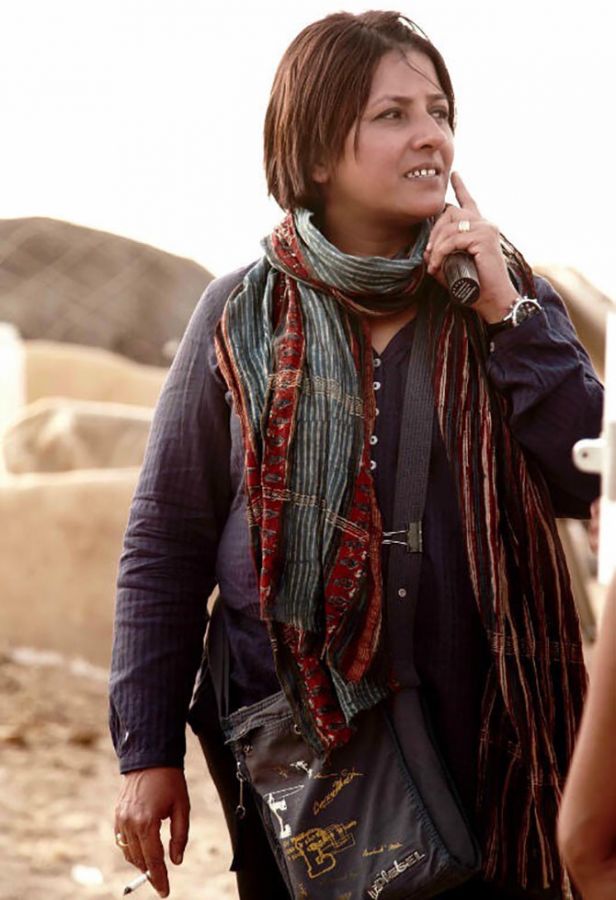
Why didn't your husband Aseem Bajaj shoot the film? You worked with Russell Carpenter instead.
It is true that Aseem shot my first two films.
Aseem made me make a promise before Parched. I was thinking of not making films anymore because it is such a difficult journey and it doesn't finally shape up the way you want.
He said, 'Leena, I would not let you do that. I will produce your next film. It will be whatever you want without restrictions.'
It was a tough promise, since it was hard to raise money. He added that he would focus on the production and raising funds and not shoot the film. He promised to get me someone he really admired.
We had met Russell a few years earlier in LA and after that, he came to India to shoot scenes for the Ashton Kutcher film Jobs. Aseem had collaborated with him on that.
Later, Russell saw my film Teen Patti. I also sent my first draft to Russell's wife Donna Conrad. She's a writer. Russell read the script and connected to it. I would say we couldn't afford Russell, but he afforded working for Parched.
That is what I like about the US. People think Americans are all about money and contracts. I worked with some really wonderful people and they had so much clarity. They would say if it is a passion project, then I have to love it.
I realised how beautifully they balance their lives and they understand these smaller budget films.
Once they are on board, there is no emotional blackmail. They work for the project, not for you.
How did Ajay Devgn come on board as producer?
I first met Ajay for Shabd. He had liked the script, but was not available at that time.
Aseem's first project as a cinematographer was with Ajay, and they got to know each other well. At one point, I was almost working on a script for Ajay. He did me a huge favour by playing the cameo in Teen Patti.
When we started Parched, Ajay said, 'You guys are mad, how will you raise money?' Then he added, 'Let me support you, why don't you use my name, if it adds value.' He also gave us seed money to start.
And I think Aseem is currently shooting another film for Ajay.
Yes, Shivaay.

In the post-Udta Punjab scenario, what do you expect from the Censor Board? You show nudity in the film, although briefly.
I believe even in Margarita, With A Straw, some of the brief nude scenes were cut. You haven't submitted it to the censors yet?
No, not yet.
By the way, the film is doing really well in its eighth week in France. We started off with 73 theatres, which went up to 87 in the second week. By the fifth week, it was in 203 theatres.
That is amazing!
Yes. Our distributor in France is really happy. The good thing is that our investors have travelled with me and have seen the reactions.
It is very different if the information had reached them from Toronto, as opposed to them being there.
It was the most overwhelming moment where people stood up and kept clapping.
So there is a lot of confidence in the film and they believe it will do well in India. They don't want a small release. They want a decent size release.
The first time some Indian filmmakers saw the film was at IFFLA. People like Hansal Mehta, who has been through struggles with the Censor Board himself, didn't think it would be much of an issue, although I understand nudity will be an issue.
I am not going to cut out the scenes. The scenes are not about the nudity, but about other ideas. If they have a problem with breasts, I can blur it out, but I will not cut out the scene.
It is a situation when two women who have gone through hell with men, start to care for each other. It is just a moment of tenderness between two women.
Yes. There might be issues with the abusing, but then again, that is used in context. I should be able to argue that there is a reason and context for the use of abuses.
I am also hopeful because it is high time we changed. We can't be living like this and thinking it's all good.
Honestly, when I made Parched I thought it was possible the rest of the world will see the film the way it is made and my country won't. That's unfair.
We cannot be the country that created the Kamasutra and then we show flowers kiss and a child is born.
For me, censorship makes no sense today. I can put the film online and it will go viral. The only thing is it will affect the business. People are already watching all sorts of things online.
The Censor Board needs to acknowledge the reality. The kind of control they are trying to maintain is just not possible. They are forcing people into the corner to rebel. But why should we do it?

